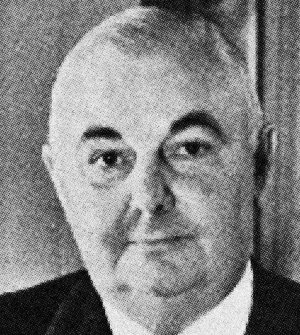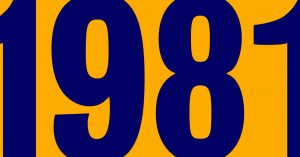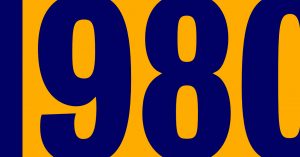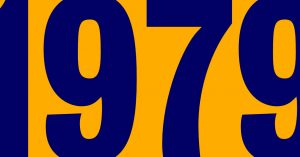ATV financial results: 1960
Prince Littler on Associated Television Limited’s 1960 results

A Memorable Year Yielding Eminently Satisfactory Financial Results
SUCCESS OF BOARD’S DIVERSIFICATION POLICY
The Industry’s Growth Continues
MR. PRINCE LITTLER’S REVIEW OF ACTIVITIES
The Fifth Annual General Meeting of Associated Television Limited will be held at A.T.V. House, Great Cumberland Place. London, W.1, on 28th September 1960.
The following is the statement by the chairman, Mr. Prince Littler, C.B.E.. which has been circulated with the report and accounts:-
The year under review has proved to be a memorable one and has yielded eminently satisfactory financial results.
The proposed dividend means that the Company will have maintained its dividend at the equivalent of 100%, bearing in mind that the capital of the Company was doubled during the course of the past financial year.
Board’s Policy
The principal business of your Company is that of a Programme Contractor licensed by the Independent Television Authority to trade in London and the Midlands, and it is primarily upon this trading that these excellent results have been achieved. It has, however, from the inception of the Company, been the policy of the Board to make investments in allied fields both at home and abroad and, in consequence of this policy, the resources of your Company are now more strongly diversified than any time since it commenced trading.
Developments overseas have proved particularly gratifying in Australia and in Canada. It should, moreover, be noted that in the USA, your Company has recently acquired full control of the Independent Television Corporation of America.
The diversified interests at home are highly encouraging and include the operation of the Muzak franchise, a 50% interest in Pye Records and a substantial and most profitable investment in British Relay Wireless. All these developments will be reported in detail later in this statement.
Transdiffusion analysis
The early history of ATV is a tangle of initials, ownership, management and investment.
In the beginning, there were two companies: Associated Broadcasting Development Company (ABDC) and Incorporated Television Programme Company (ITPC). Very simplified, ABDC, under Norman Collins, applied for the London weekend contract but couldn’t afford to operate it. ITPC, under Lew Grade, didn’t want a regional franchise but wanted in on the new ITV and had money to spare. The solution was obvious: put the two together and you’ve got a functional ITV contractor.
ATV was, corporately, ABDC’s management with ITPC’s money. The two are now locked together: ABDC can’t exist without ITPC’s money, ITPC has no outlet on the new ITV without ABDC. ATV owns a slice of ITPC; ITPC owns a slice of ATV. There were, unsurprisingly, power struggles. A solution, it seemed at the time, was for ATV to buy ITC (the shifting of names and initialisms does not make following this any easier. ABDC > ABC (briefly, and not that one) > ATV; ITPC > ITC, but with the ‘I’ standing for different things in different countries just to make it even more awkward). Once they’re one company, there’s just one mission, right? But Lew Grade isn’t going to give up control of ITC and needs to be bought off with something. He gets it: more of those precious voting shares in ATV itself.
Success of Consolidation Policy
Your Company has been actively trading for some years. The period of licence from the Independent Television Authority extends until July 1964 and your Board has, with conspicuous success, sought to consolidate the Company’s position as the only major seven-day-a-week Company operating under licence from the Authority.
At the outset of operations your Managing Director, Mr. Val Parnell, and his Deputy Managing Director, Mr. Lew Grade, resisted the pressures put upon them to equip large studios and to build large offices. The volume of programming both for ATV’s own domestic purposes and for the Independent Network as a whole has, however, necessitated a plan of expansion, carefully phased over the past and current years. Your Company has therefore purchased the important riverside site at Vauxhall. Moreover, the Company has proceeded to enlarge its Elstree Studios in order to meet the steadily increasing commitments of live, tape and film production for home and overseas television as a whole.
New Headquarters
During the past year the headquarters of Associated Television Limited have been moved from Television House, Kingsway, to an island site office block in Great Cumberland Place, W.1. The effect of this move has been beneficial to the Staff, and has resulted in a marked increase in inter-departmental efficiency.
The financial results reflect the confidence expressed by your Board in December 1959 when an interim dividend of 8s. per share, less income tax, was declared on the Ordinary Shares of £1 each, and 2s, per share, less income tax, on the ‘A’ Ordinary Stock Units of 5s. each.
Bonus Issue Approved
At an Extraordinary General Meeting held on the 21st January 1960 the shareholders passed a resolution, submitted by your Directors, for the capitalisation of £2,325,000 [£44.3m in today’s money allowing for inflation – Ed] of reserves by the issue of 9,300,000 ‘A’ Ordinary Shares of 5s, each, credited as fully paid, to the holders of the then existing issued share capital in the proportion of four new shares for each existing Ordinary Share of £1 each and one new share for every existing ‘A’ Ordinary Stock Unit of 5s, each. The new shares, on issue, were converted into ‘A’ Ordinary Stock Units of 5s, each.
Profits & Dividends
The Group profit before taxation for the year ended 30th April 1960 amounted to £5,388,330 [£102.6m] as compared with £5,316,493 [£101.3m] in the previous year. Taxation takes £2,711,820 [£51.65m] as against £2,715,076 [£51.72m]. The Group net profit is £2,676,510 [£51m] of which £1,031 [£19,600] is attributable to outside shareholders of subsidiaries leaving a profit attributable to the Parent Company of £2,675,479 [£50.96m] as against £2,601,048 [£49.54m] last year. The subsidiary companies retain £76,852 [£1.5m] leaving £2,598,627 [£49.5m] to be dealt with in the accounts of the Parent Company. To this amount must be added £1,711,215 [£32.6m], the balance brought forward from the previous year, and £445,000 [£8.5m] transferred from General Reserve – making a total of £4,754,842 [£90.6m] before appropriations. Your Directors propose recommend a final dividend of 6/- per share on the Ordinary Shares of £1 each and 1/6 per share on the ‘A’ Ordinary Stock Units of 5/- each. The interim dividend already paid and the proposed final dividend absorb £1,424,063 [£27m]. After deducting this amount, together with the sum of £2,325,000 [£44.3m] involved in the capitalisation effected in January and a transfer of £500,000 [£9.5m] to Investment Reserve, there is a balance of £505,779 [£9.6m] to be carried forward in the accounts of the Parent Company.
The accounts include provision for the distribution of £264,171 [£5m] for the Staff Profit-Sharing Scheme.
Home Investments
In the field of your Company’s home investments, it should be recorded that during the year British Relay Wireless and Television Limited made a bonus issue of one 5/- Ordinary Share for two 5/- Ordinary Shares. From this issue you Company obtained 134,000 new 5/- Ordinary Shares by way of capitalisation and the Conversion Right attached to your Company’s holding of £500,000 [£9.5m] 7% Convertible Unsecured Loan Stock 1967-1968 was increased from 184 to 201 shares for each £100 of stock. In March 1960 British Relay Wireless and Television Limited made a rights issue of two new 5/- Ordinary Shares for five 5/- Ordinary Shares and your Company subscribed for 562,800 new Ordinary Shares of 5 at 19/- each, which was its entitlement in respect of its shareholding and under the terms of the Loan Stock Trust Deed. The Stock is convertible on the 30th September 1961. The shares to which your Company would become entitled on conversion would, if there is no change in the present market price, have a value of approximately £1,100,000 [£21m]. British Relay Wireless and Television Limited has recently made a major extension in the Glasgow area and your Board remains confident that this investment will continue to grow.
New Franchise Acquisition
The subsidiary company which handles the sale of Muzak is developing most satisfactorily and a wide range of customers, including Banks, Hospitals, Hotels and Factories as well as Supermarkets, Restaurants and Shops, are installing this service. In the course of the current year operations have been extended to Birmingham and will shortly be followed by similar expansion in Manchester. In this connection shareholders will be interested to learn that we have acquired the Muzak franchise for Australia and New Zealand and it is felt that there is great opportunity for development of a background music service in this area.
Pye Records, in which your Company has a 50% interest, has been largely reorganised and the new plan of direct distribution to retailers has proved an outstanding success. This, together with the excellent reception given to the ‘Golden Guinea’ records, has had a marked effect upon the gramophone industry as a whole.
Your Group’s British production subsidiary ITC-Incorporated Television Company Limited continues to make good progress, During the past year the number of commercial television stations throughout the world has more than doubled and we are now actively selling programmes in a continually expanding market. The series ‘Danger Man,’ which is still under production Elstree, has been sold over the full Canadian network at a price higher than that previously paid for any similar series. Further series and pilot films are in the planning stage and will shortly commence production.
Overseas Investments
As regards investments overseas in the USA, Independent Television Corporation Inc., which, as at 30th April 1960, we held a 50% participation, has continued to handle the distribution of your Company’s film productions and has achieved a turnover of close to $10,000,000 [$103m]. During most of the period under review conditions have been particularly difficult, largely because of the increasing tendency by the three major television networks to assume an attitude of inflexibility towards programmes proposed by the independent producing companies. Recently, however, there have been signs of a slight improvement in business generally and your Board remains of the opinion that it is vital for the Group to have a direct outlet to the American market.
Since the end of the financial period under review we have purchased the balance of the share capital of Independent Television Corporation Inc. at a price which your Board regards as satisfactory. Having acquired control of the company we have taken steps to strengthen the management and to reduce the overheads of the operation and are confident that in time, and with adequate product available for distribution, this company should prove profitable to the Group. Nevertheless, in view of present uncertainties, you will see that your Board, as a measure of prudence, has set aside in the accounts before you a sum of £500,000 [£9.5m] to Investment Reserve.
In Canada your Company has purchased 25% (the maximum permitted under Canadian law for non-Canadian investors) of CJCH – the Halifax, Nova Scotia, radio station which has been awarded the licence for independent commercial television in that area.
The diversified interests of your wholly owned Australian subsidiary continue to prosper. Commercial radio in general is maintaining its level of profit and commercial television is expanding rapidly. The Sydney Commercial Television Station showing increasing profits and the Queensland and Adelaide Stations are rapidly advancing to profit-making stage. Altogether the Group’s television investments in Australia, which have a book value of nearly £250,000 [£4.8m], have grown in value to a sum greatly in excess of the amount invested. Since the end of the financial period under review ATV (Australia) Pty. Limited has sold the Artransa studios and the film production side of the business to Station ATN, the Sydney Commercial Television Company, in which we hold 9.7% of the share capital. We have retained the profitable radio transcription side of the business.
Level of Acceptability
All these investments business at home and it should ancillary to the Company’s main be recognised that the success of forward in the accounts of the any independent television company must depend upon the degree of popular acceptance of its those programmes by those members of the British public whom it serves. Here, it is noteworthy to add that during the calendar year January to December 1959 the level of acceptability in London (where the weekday programmes are provided by another company) has been 69% against the BBC’s 31%, whereas in the Midlands (where Associated Television Limited has the five-day operation) during the same period the level of acceptability has been 74%, against the BBC’s 26%.
Documentary and Religious Programmes
Despite the fact that such popular productions as Mr. Val Parnell’s ‘Sunday Night at the London Palladium’ have continued to occupy a high place in the ‘Top Ten,’ your Company has been responsible also for such serious documentary programmes as ‘We Dissent’; ‘The Western’ – an enquiry into the popularity of Western films; a medical programme, ‘Fear Begins at 40’: ‘The Art of Architecture’; the series of five lectures by Sir Kenneth Clark on ‘Revolutionary Painters’; the lectures on British Prime Ministers by Dr. A. J. P. Taylor; and the ‘Right to Reply’ series in which Mr. William Clark interviewed among others, Mr. Selwyn Lloyd. Mr. Hugh Gaitskell, the late Aneurin Bevan, Father Trevor Huddleston, M. Jacques Soustelle, M. Hammarskjöld, the late John Foster Dulles, Mr. Krishna Menon, Mr. Henry Cabot Lodge, Mr. Paul Hoffman, and Mr. Norman Manley, Prime Minister of Jamaica.
It will be remembered that Associated Television Limited was the first company to introduce regular religious programmes in Sunday television and those who took part during the past year included their Graces the Archbishops of Canterbury and York, the Bishops of Kensington, Lincoln, Manchester, Woolwich and Bedford, the Roman Catholic Archbishop of Liverpool, Dr. Heenan, Dr. Donald Soper and Lord Woolton.
Notable Achievements
Notable also have been those series which, while serious in content, have nevertheless secured maximum audiences. The series ‘Emergency – Ward 10’ has throughout the greater part of the year played to a weekly audience in excess of 20 million viewers. The new series ‘Probation Officer’ has proved equally successful and has earned wide praise from social workers and the Church alike.
Among British companies, your own Company has maintained its lead in the field of international television film production. In addition to such series as ‘Four Just Men’ and ‘Danger Man,’ produced in this country, the Company is just completing a series, ‘Whiplash,’ in Australia.
Company’s Major Role
Your Company has continued to play a major part in the independent television industry itself. Your Deputy Chairman, Mr. Norman Collins, has for the past year acted as Chairman of the Independent Television Companies Association and is currently also the Chairman of Independent Television News Limited, the company which provides the news bulletins for all stations. Mr. James Drummond, the Financial Director of your Company has for the past year acted Chairman of the General Purposes Committee of the Independent Television Companies Association. Mr. Bill Ward, Productions Controller of your Company, is the current Chairman of the Society of Film and Television Arts and I am pleased to place on record that he is the recipient of the Award of the Guild of Television Producers and Screenwriters for the best Light Entertainment Producer of 1959.
The Industry’s Growth
The television industry as a whole continues to grow and it is pleasing to note that during the year under review the ITA has appointed new companies to serve East Anglia and Northern Ireland and has erected a satellite station to give coverage to the Dover area.
By April 1960, 47,578,000 viewers were within reach of programmes broadcast from the ITA transmitters and the average total peak viewing audience for independent television is now over 13,000,000, compared with the BBC’s 5,500,000, as measured by TAM in homes with a choice of programmes.
Your Company’s operations have from the outset been divided between London and the English Midlands and the proportion of locally produced programmes in the Midlands is higher than that of any other independent company.
Your Company, nevertheless, continues to feel that an uninterrupted seven-day-a-week operation in any one area is calculated to provide the most satisfactory service to viewers, and your Company again places on record the fact that, in the public interest, it would welcome the introduction of new stations providing alternative services, so that genuine competition could be assured.
Relations with the Independent Television Authority, under its Chairman Sir Ivone Kirkpatrick, G.C.B., G.C.M.G., have been most closely maintained and I would like to express the gratitude of your Board and more particularly of the Executive Directors for the unfailing service rendered by the officers of the Authority at all levels
Tribute to Management and Staff
As in other years I would, as Chairman, like to pay tribute to the services rendered by the Management. Your Company’s Managing Director, Mr. Val Parnell, and your Deputy Managing Director, Mr. Lew Grade, have continued not only to shoulder the heavy responsibility of the manifold interests of the Company but have added to their other duties by arduous business missions abroad. In addition, non-Executive Directors have continued to render most valuable services to the Company. They have given generously of their time and I would like to express my thanks to them.
Finally, I am happy to report that the Staff in all departments continue to reveal all those characteristics of enthusiasm which have served to build up the Company and I am sure the shareholders will wish to join me in thanking them for their loyal services rendered during the past year. It is gratifying that the Staff Profit-Sharing Scheme again enables the Company to show its appreciation of their efforts.
About the author
As a public company with shareholders, ATV was required to publish a detailed Annual Report at the end of each financial year. It was common to also publish a Chairman's Statement, summing up the report in more readable language.





